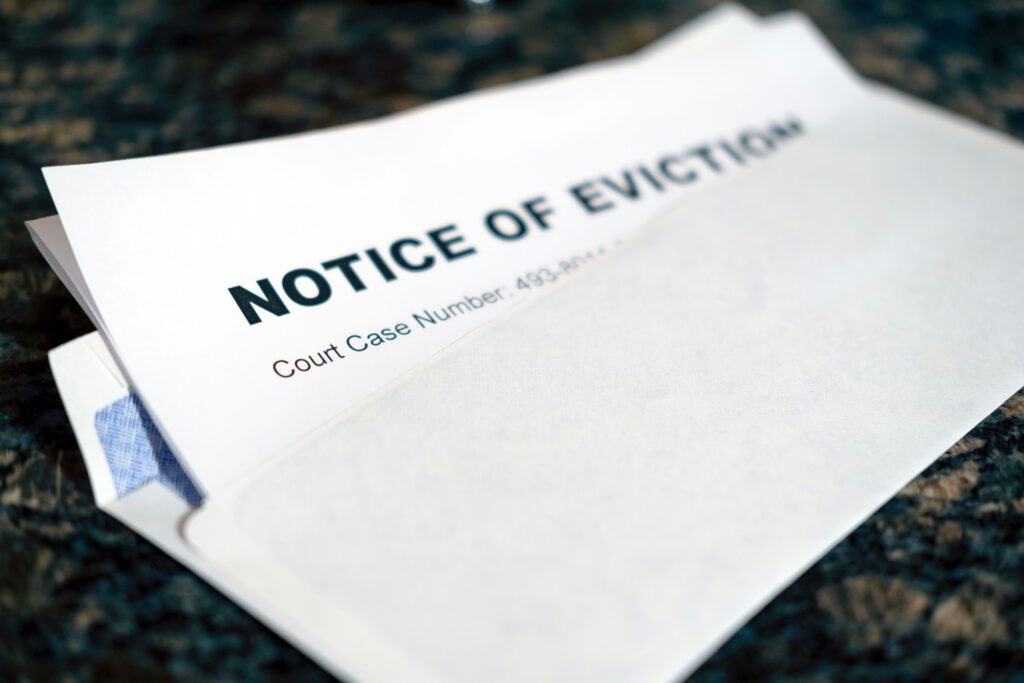Landlords in Jamaica can start an eviction under the Rent Restriction Act for specific legally recognized reasons—commonly:
- Rent overdue for 30+ days
- Tenant breached a key clause (e.g. unauthorized sublet)
- Landlord needs the property or wants to renovate it
If you’re paying on time and haven’t broken your lease, eviction usually isn’t an option for landlords.
Notice to Quit: Step One
If a valid reason exists, the landlord must serve a Notice to Quit:
- A full one-month notice—it should expire just before your next rent due date (e.g. rent due May 1 → Notice given by April 30)
- The notice must clearly state why you must leave and the exact date
If you pay overdue rent before the notice expires, it automatically becomes void.
Court Proceeding: What Happens If You Stay
If you don’t move out before the notice expires, here’s what follows:
- Landlord files a claim for recovery of possession in the Resident Magistrate’s Court, using the expired notice and proof of tenancy.
- The court issues a summons, served per legal requirements (any adult at the property or taped to the door is acceptable)
If you don’t respond or attend, the court may issue default judgment and grant an eviction order. If you contest, a trial date is set.
Eviction Order & Enforcement
Once a court order for possession is granted:
- You may be given a grace period to move out (the court usually allows some time if requested.
- If you still refuse, the landlord can apply for a Warrant (Writ) of Possession, allowing law enforcement (bailiff or constable) to enforce the eviction—provided it’s within 6 months of issuance.
Importantly, landlords cannot do anything extra-legal, like changing locks, harassing tenants, or disconnecting utilities. Violators may face up to 12 months imprisonment.
How Long Does All This Actually Take?
The eviction timeline varies based on several factors:
- Tenant cooperation (willing to move quickly vs. contesting)
- Landlord’s adherence to legal process
- Court backlog and complexity of the case
Typical timeline:
- Notice to Quit: ~30 days
- Court filing and summons: a few weeks
- Hearing to judgment: sometimes weeks to months, depending on disputes
- Writ of Possession and clearance by bailiff: can be weeks after judgment
In practice, evictions often take several months, especially if challenged in court.
Tenant Rights & Best Practices
- Always respond to a Notice to Quit if you intend to stay.
- If you allege wrongful eviction, challenge the case at the hearing.
- Be aware: accepting a court order doesn’t erase your entry from an eviction record—this can affect future rentals.
Landlords must NOT resort to illegal eviction tactics—no lockouts, utility shutoffs, or harassment allowed.
Can a Landlord Evict You Without a Court Order in Jamaica?
Short answer: NO. Your landlord cannot legally evict you without going through the proper court process, no matter what they tell you.
What landlords can’t do:
- Change locks while you’re out
- Remove your belongings from the property
- Turn off utilities to force you out
- Threaten you with immediate removal
- Show up with “security” to intimidate you
The legal reality: Every eviction in Jamaica must go through the Resident Magistrate’s Court. Your landlord must file proper paperwork, serve you legal notice, and get a court order before any removal can happen.
How Long Does it Take to Evict a Tenant in Jamaica?
Realistic timeline: 3-8 months from start to finish.
The process breakdown:
- Notice period: 1 week to 6 months (depending on tenancy type)
- Court filing: 2-4 weeks for paperwork processing
- Court hearing: 1-3 months wait time (courts are backed up)
- Judgment: If tenant contests, add another 1-2 months
- Enforcement: 2-4 weeks for bailiff to execute order
Factors that extend the timeline:
- Tenant contests the eviction in court
- Paperwork errors requiring refiling
- Court scheduling delays
- Tenant files counter-claims
- Appeals process
How Soon Can a Landlord Raise Rent in Jamaica?
The legal requirements:
With proper lease terms: Rent increases must follow whatever schedule is written in your rental agreement.
Without written lease (periodic tenancy):
- Monthly tenants: 1 month’s written notice
- Weekly tenants: 1 week’s written notice
- Yearly tenants: 6 months’ written notice
Important protections:
- Increases must be “reasonable” – massive jumps can be challenged
- Notice must be in writing (verbal increases don’t count)
- Some areas have rent control restrictions
Bottom Line
Evictions in Jamaica are legally structured but can be slow—especially if you engage the court process. As a tenant:
- Stay informed.
- Respond promptly to notices.
- Use the hearing to present your side or request a timeline.
- Avoid self-help or confrontational responses (which landlords can’t legally do anyway).
Got a landlord who won’t give you space? Read Dealing with Nosy Live-In Landlords in Jamaica
Disclaimer:
The information provided in this article is for general informational purposes only and does not constitute legal advice. While efforts are made to ensure accuracy, laws and regulations may change, and individual circumstances can vary. Tenants and landlords are encouraged to consult with a qualified attorney or legal professional for specific legal advice regarding their situation. The author and website assume no liability for any decisions or actions taken based on the content of this article.



